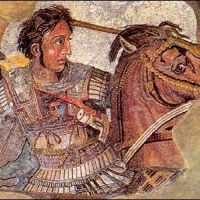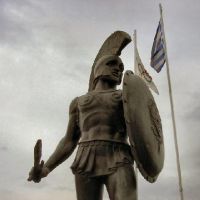- About Us
- Columns
- Letters
- Cartoons
- The Udder Limits
- Archives
- Ezy Reading Archive
- 2024 Cud Archives
- 2023 Cud Archives
- 2022 Cud Archives
- 2021 Cud Archives
- 2020 Cud Archives
- 2015-2019
- 2010-2014
- 2004-2009
 |
The Cud On History: Military Prowess As Pre-Requisite For Leadership In Ancient Greece |
The history of Ancient Greece is a history of repeated conflicts, rivalries and tensions as city-states attempted to secure their interests and expand their influence in the face of other ambitious states and foreign interventions. As a result, the period is marked by individuals who were extremely capable in military matters due to the circumstances of their time. Military ability as a requisite for leadership was common, therefore, but always remained hinged upon two political factors: the nature of the political system that was in place in a city-state, and the political climate of that  particular moment. In Athens, men such as Themistokles, Perikles and Alkibiades were statesmen and politicians first, and military leaders second, according to whether the circumstances of their day required such ability to be exercised. As a contrast, Epaminondas in Thebes relied upon military prowess alone, and lacked the skills of a statesman. Spartan leaders like Brasidas operated within a system that was founded upon military values and customs. In Macedonia, as in Sparta, leadership of the state was based upon succession, however the prevailing political climate demanded that Philip and Alexander were competent in military matters if their state and subsequent spheres of influence were to remain secure.
particular moment. In Athens, men such as Themistokles, Perikles and Alkibiades were statesmen and politicians first, and military leaders second, according to whether the circumstances of their day required such ability to be exercised. As a contrast, Epaminondas in Thebes relied upon military prowess alone, and lacked the skills of a statesman. Spartan leaders like Brasidas operated within a system that was founded upon military values and customs. In Macedonia, as in Sparta, leadership of the state was based upon succession, however the prevailing political climate demanded that Philip and Alexander were competent in military matters if their state and subsequent spheres of influence were to remain secure.
Perikles, the son of Xanthippus presents the most convincing example of the way in which the Athenian democracy placed an emphasis upon an individual's ability as a statesman before military ability in determining the city-state's leaders. In order to secure support and a strong power base to assume leadership over and above his contemporaries, Perikles initially had to embark upon a policy which would appeal to the demos, and Plutarch suggests that, at least in the early part of his career, Perikles' policies successfully 'bribed' the people. Once in power, Perikles set his various democratic reforms into effect, however the outbreak of the Peloponnesian War forced him to employ military tactics as the leader of the Athenian forces. Thucydides tells us that Perikles' war strategy for Athens was "… to bide her time … take care of her navy and avoid trying to add to the empire during the course of the war." This was a patient strategy that highlighted Perikles' wariness in military operations and an unwillingness to engage in

conflicts that involved much danger or uncertainty, and it was in part due to his insignificant results that Perikles was briefly removed from power in 430. Perikles' death soon after from the plague in 429 meant that the ultimate success or failure of his strategy could not be realised, however the more aggressive military strategies pursued by some of Perikles' successors such as Kleon and Alkibiades suggest that in the context of a crisis such as the Peloponnesian War democratic Athens looked more readily to leaders with strong military ability as well as qualities which were befitting of a democratic leader.
In Sparta, the very nature of the political and social system in place relied upon military controls to keep the system protected from helot uprisings. In a conflict such as the Peloponnesian War, however, Brasidas, the son of Tellis, was obviously able to attract the support for military leadership because of his military exploits, as proven at Pylos in 425, and through his successes in breaking up the Athenian empire in the north, which culminated in his death in 422 in the Spartan's victory over Kleon's Athenian forces at Amphipolis. Though Brasidas certainly possessed a character that Thucydides states was somewhat 'unique' for a Spartan, it was military prowess and Brasidas' strong reputation in such matters that ensured his leadership during the Peloponnesian conflict, and attracted the jealousy of many of his contemporaries. As Thucydides wrote, Brasidas was "… a man who in Sparta itself had a great reputation for energy in every direction and who on his foreign service had shown himself to be so valuable to his country." The volatile state of Athenian-Spartan relations during Brasidas' career required a strong and capable leader in a commanding role for the Spartan forces, and Brasidas fulfilled such requirements for a time.

The novel tactics employed by the Theban Epaminondas to achieve victory at the Battle of Leuctra in July 371 showed that the invincible Spartan army could be defeated and the success made Epaminondas Thebes' leading political figure. Epaminondas led four subsequent invasions of the Peloponnese during his career (initially as general, but eventually as boeotarch), and he persuaded the Thebans to make a bid for naval hegemony in 364, but apart from the foundation of Messenia in 369, his enterprises ultimately failed to produce permanent advantage for Thebes. Epaminondas died at the Battle of Mantineia in 362. Above all, the career of Epaminondas illustrates how in Thebes military ability was able to secure leadership of a powerful state. Whilst he was a military genius that stood distinct from his countrymen, Epaminondas' limited ability in political matters ultimately left Thebes without any of the machinery and reforms in place that were needed for its continued predominance in foreign affairs and military power in the aftermath of his death. Epaminondas failed to organise an effective strategy for financial and governmental matters, and he failed to secure Boetian national unity that was so critical to any future Theban hegemony. Military ability was thus critical in Thebes to assert any superiority in Greece, however the skills of a statesman were also required to balance and consolidate such superiority.
The successful military prowess of Philip II, finally, was essential to strong leadership over the state of Macedon and Greece, however Philip achieved this with a combination of diplomacy and warfare. During his distinguished career Philip unified Macedon and secured control over neighbouring regions such as Illyria (358) and Chalcidice (348), and though he increased his influence in Greece through political means, negotiating for a time with Athens (a peace settlement was reached in 346), Thebes, and other cities, when attempts at diplomatic solutions had failed, it was his decisive victory over the Athenian and Theban forces at Chaeronea in November 339 which effectively marked the end of significant

resistance to Macedon. Whilst Philip's success owed a great deal to his military ability and significant reforms which made the Macedonian army the best the world had ever seen to that point in time, he complemented these military achievements with political and diplomatic measures during his career, as in the League of Corinth, established in 337, which aimed to preserve and perpetuate the general peace in Greece under Macedonian rule. Philip further avoided interfering with Athens' democratic system so as to facilitate future co-operation with Macedonia and avoid tension, and had he not been assassinated in 336 this combination of military and political ability, used to full advantage, may have proved victorious against the Persian Empire in the East. The legacy and example of Philip's rule was handed down to his son Alexander with relative ease, and this model of statesmanship and warfare continued with success.
Military ability proved to be important in the leadership of Ancient Greece since the repeated conflicts and power struggles of the period relied so heavily upon competence in such matters if any resolution to tensions could be met, and if a state was to consolidate and secure its power. Though military ability was not given as high a priority in all of the Greek states (particularly in accordance with the political system which was in place in a particular region), what seems clear from an analysis of significant individuals from the period is that this military ability had to be combined with the skills of statesmanship and diplomacy if a leader was truly to be effective in Ancient Greece. Brasidas of Sparta showed characteristics of good statesmanship that complemented his

exceptional military talent, and Perikles, in contrast displayed sound military ability that complemented his superior statesmanship. Epaminondas ruled powerful Thebes based principally upon his own individual skill as a military tactician, and his lack of political ability left Thebes in difficulty after his death. Philip of Macedon, finally, perhaps benefiting from the lessons of past leaders' experiences, brought the Macedonian empire to the fore with a combination of military skill and statesmanship, and ensured that social, political and economic matters received just as much attention as those of the military. Strong leadership in Ancient Greece depended upon a mastery of such diverse skills.
